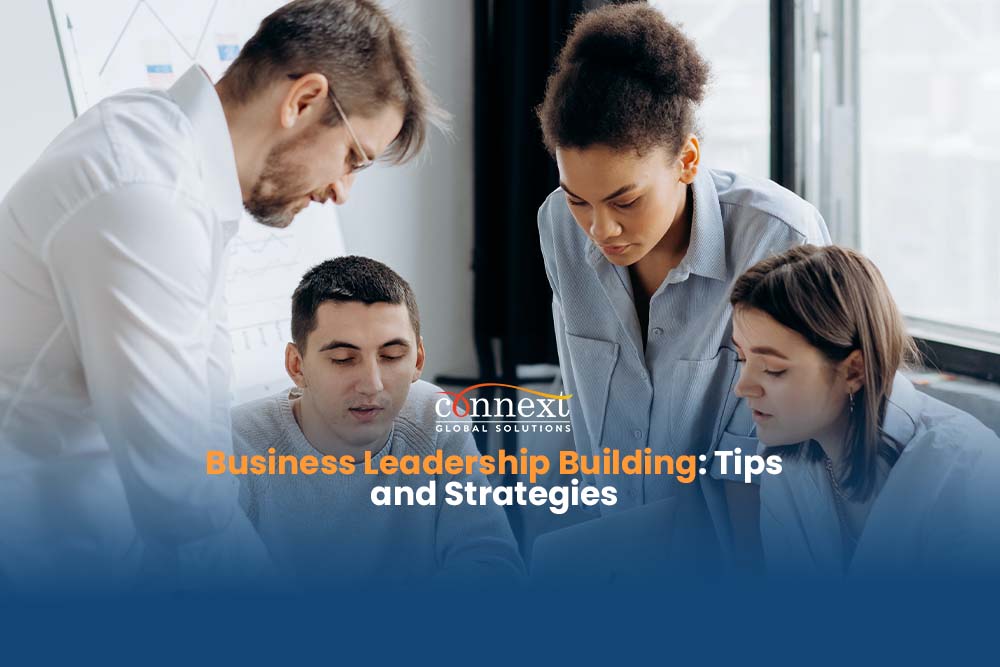A Comprehensive guide to building business leadership.

Key Takeaways:
- Define a clear strategic vision: A purpose-driven strategy acts as a roadmap—aligning teams, guiding resource allocation, and ensuring long-term competitiveness .
- Cultivate a global leadership mindset: Embrace cross-cultural collaboration, build diverse networks, and leverage global knowledge sharing to gain innovative perspectives .
- Foster strong team culture and camaraderie: Prioritize open communication, regular team activities, and recognition practices to boost engagement, collaboration, and trust .
- Enhance communication with purpose: Adopt adaptive listening and clear storytelling—using tools like Slack or Zoom—to ensure alignment and clarity across the organization .
- Lead with empathy and support learning: Encourage psychological safety, continuous development, and DEI initiatives to empower teams and drive sustained success .
Introduction: Building effective leadership is essential for any business to thrive and succeed in today’s competitive landscape. A strong leadership team sets the tone, inspires employees, and drives organizational growth. This guide aims to provide you with practical steps and strategies to build and develop a powerful leadership culture within your organization.
- Define Your Leadership Philosophy: Start by clarifying your leadership philosophy and values. What do you believe in as a leader? What principles guide your decision-making? Clearly articulate these beliefs and communicate them to your team. This establishes a foundation for leadership development and creates a shared vision for your organization.
- Identify Leadership Competencies: Identify the key competencies and skills required for effective leadership in your industry. These may include strategic thinking, communication, emotional intelligence, adaptability, and problem-solving. Create a competency framework that outlines the core skills and behaviors expected from leaders at different levels within your organization.
- Recruit and Hire Strong Leaders: When hiring new leaders, go beyond assessing technical skills and experience. Look for individuals who align with your leadership philosophy, possess the identified competencies, and demonstrate a track record of success. Conduct thorough interviews, reference checks, and consider using assessment tools to evaluate candidates’ leadership potential.
- Provide Ongoing Training and Development: Invest in continuous leadership training and development programs. Offer workshops, seminars, and online courses that cover a range of topics, such as communication, decision-making, conflict resolution, and team building. Encourage leaders to attend conferences, pursue advanced degrees, and participate in executive coaching programs to enhance their skills.
- Foster a Learning Culture: Create an environment that encourages learning and growth. Encourage leaders to seek feedback, both from their teams and peers, and provide opportunities for self-reflection. Implement mentoring programs and establish a culture of knowledge sharing, where leaders can learn from each other’s experiences and best practices.
- Promote Accountability and Ownership: Leaders should be held accountable for their actions and decisions. Establish clear performance expectations and metrics for each leadership role. Regularly review progress and provide constructive feedback to help leaders improve. Encourage autonomy and ownership, allowing leaders to make decisions within their areas of responsibility.
- Develop Effective Communication Channels: Effective communication is crucial for leadership success. Foster open and transparent communication channels throughout your organization. Encourage leaders to actively listen to their teams, provide regular updates, and engage in two-way communication. Leverage technology platforms, such as project management tools and collaboration software, to facilitate efficient communication.
- Encourage Innovation and Creativity: Successful leaders embrace innovation and encourage creative thinking. Foster a culture that values new ideas and rewards experimentation. Provide resources for research and development, and create platforms for employees to share their innovative solutions. Celebrate successes and learn from failures to foster a culture of continuous improvement.
- Lead by Example: Leaders must lead by example to gain trust and respect from their teams. Demonstrate the behaviors and values you expect from your leaders. Be transparent, accountable, and uphold high ethical standards. Show empathy, actively listen to your employees, and be accessible. Your actions will set the tone for the entire organization.
- Recognize and Reward Leadership Excellence: Recognize and reward exceptional leadership within your organization. Implement recognition programs that celebrate achievements and exemplary leadership behaviors. Offer opportunities for career advancement and personal growth to motivate leaders to continue developing their skills.
Conclusion: Building effective business leadership requires a deliberate and continuous effort. By defining your leadership philosophy, identifying key competencies, providing training and development, fostering a learning culture, and promoting accountability and innovation, you can create a strong leadership culture that drives success. Remember, leadership development is an ongoing process, and investing in your leaders will yield long-term benefits for your organization.
Connext helps business focus on building their leadership strategy while offshoring certain repetitive, low risk functions. Learn more about our outsourcing solutions here.
Connext Global Solutions helps companies build custom, dedicated nearshore support teams. Learn more about working with Connext Global Solutions.
Frequently Asked Questions
A leadership philosophy is a set of core values and beliefs that guide your decision-making and leadership style. Defining it provides clarity, consistency, and alignment for your team, enhancing trust and organizational culture
Start by identifying key skills like strategic thinking, communication, and emotional intelligence. Use tools—like a competency framework—to assess your current abilities and design training, mentorship, or stretch assignments for growth
Engage with diverse perspectives, build cross-border networks, study global trends, and embrace continuous learning. This expands your adaptability and helps you navigate increasingly diverse markets effectively
Use structured approaches—like transparent storytelling and active listening—supported by collaboration tools (e.g., Slack, Zoom). Regular feedback loops, open dialogue spaces, and cultural sensitivity reinforce clarity and accountability
Encourage open discussions, welcome diverse opinions, offer empathy, and value vulnerability. When people feel safe to share, innovation and engagement thrive through trust and inclusion .









